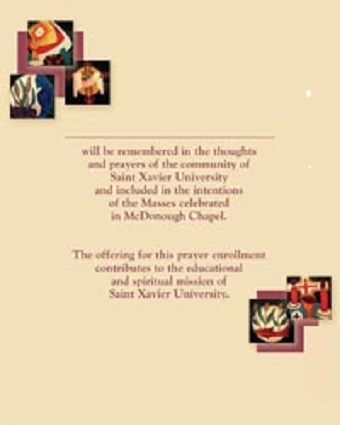Prayer is not seen as a zero-sum game; God is not limited to answering so many prayers a day, and there is no limit to the number of people that can pray each day. However, sometimes people think that certain issues need more attention than others, either in hopes that more attention to the problem will increase the odds of it being answered. Because of this some organizations have created prayer circles, where the organization as a whole prays for some specific effect. In order to facilitate this they have prayer enrollment cards, both to find out what those prayers are as well as to gather those that will help pray for them.
Each organization has a different way of disseminating these cards as well as using them. Some churches have card simply available in the vestibule; petitioners fill out the card and then return them to a box. The body of the church will then add a special prayer directed to the granting of those prayers, asking that they as a group be answered without worrying about the specifics of the requested prayers. In some cases, the pastor may determine that certain prayers need special attention, and so will somehow mention these requests to the congregation as a whole, either mentioning them directly in the sermon or as part of the church bulletin.
Other churches have a group of people, usually women, that will take the prayer cards and pray for the specific requests individually rather than as a single group. This individual prayer is sometimes referred to as “cenacle prayers”, after the room where Jesus and his disciples stayed and held the Last Supper, and is not always linked to a specific church. Either approach works: The blanket prayer works by allowing the petitioner to give up his request to God and puts it directly in His hands. Cenacle prayer makes the petitioner feel better as they know that someone will pray specifically for the supplicant.
 When it comes to collecting prayer enrollment cards, a number of different methods are in use. The traditional manner is to have the cards dispersed during the service as well as being available in some sort of receptacle; these cards are either collected at the end of the service or are tossed into a box or other receptacle. Prayer cards can also be mailed to a central address; a number of non-denominational groups do that as well. Electronic means are also possible; some cenacle prayer sites collect the information through an electronic form that is e-mailed to the organization collecting them. Through this methods the prayers are collected and then given to those that do the praying.
When it comes to collecting prayer enrollment cards, a number of different methods are in use. The traditional manner is to have the cards dispersed during the service as well as being available in some sort of receptacle; these cards are either collected at the end of the service or are tossed into a box or other receptacle. Prayer cards can also be mailed to a central address; a number of non-denominational groups do that as well. Electronic means are also possible; some cenacle prayer sites collect the information through an electronic form that is e-mailed to the organization collecting them. Through this methods the prayers are collected and then given to those that do the praying.
This is a service that is usually provided by volunteers. Although some organizations do suggest a small donation in order to help cover administration costs, in most cases the service is totally free. However, the service provided is well worth any price, as the supplicant is given some solace: By taking on the prayer, the worry is lessened on the part of the supplicant as the issue is given up to a higher power, and the supplicant is better able to deal with the issue in his personal life. This is not because they have stopped worrying about it, but rather because they are no longer responsible for it, and that shift gives them added clarity when it comes to dealing with it.
It may seem like a small favor, but it is a form of therapy that works. At least, it helps the person move on, and that makes it well worth it.




